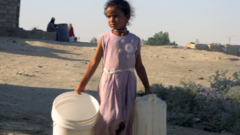
Turkish Air Strikes Devastate Water and Electricity Infrastructure in North-East Syria
Turkish air strikes have severely impacted the Autonomous Administration of North and East Syria (AANES), cutting off electricity and water access for over a million people in a region already struggling with extreme drought and civil war. Between October 2019 and January 2024, Turkey conducted more than 100 attacks on oil fields, gas facilities, and power stations in the Kurdish-held region.
The attacks have critically damaged the region’s water infrastructure, particularly the Alouk water station, which previously supplied water to Hassakeh province. Now, more than a million people rely on water deliveries from tankers pumped from 20 kilometers away. The situation is dire, with water becoming increasingly scarce and precious. Tanker drivers report desperate scenes, with people fighting and pleading for water supplies.
The conflict stems from Turkey’s long-standing tensions with Kurdish forces. Turkey considers the AANES and its associated Kurdish militia as extensions of the Kurdistan Workers’ Party (PKK), which Turkey, the EU, the UK, and the US designate as a terrorist organization. Turkish President Recep Tayyip Erdogan has described the AANES as a “terror state” next to its border.
Climate change has further exacerbated the region’s challenges. The Tigris-Euphrates basin has seen average temperatures rise by 2°C over the past 70 years, contributing to an extreme agricultural drought since 2020. The Khabour river, once a water source, has dried up, forcing residents to depend on alternative water sources.
In 2019, Turkey took control of the Ras Al-Ain area, where the Alouk water station is located, claiming it needed to establish a “safe zone” to protect against terrorist attacks. The UN has previously raised concerns about repeated water supply disruptions.
International lawyers suggest these attacks may constitute severe violations of international law. A February 2024 UN commission report indicated that the October 2023 attacks on electricity infrastructure could potentially be classified as war crimes due to depriving civilians of water access.
Turkey maintains that it targets only military infrastructure and denies intentionally harming civilians. The government attributes water shortages to climate change and poor infrastructure maintenance.
Local residents feel abandoned and desperate. Osman Gaddo from the water board expressed frustration, saying, “We have made so many sacrifices – so many of us died in battle. But nobody comes to rescue us. We are just asking for drinking water.”
Satellite imagery confirms widespread power outages, with NASA scientist Ranjay Shrestha noting significant regional blackouts. The attacks have struck electricity transfer stations in multiple areas, including Amouda, Qamishli, Darbasiyah, and the main power plant at Swadiyah.
The situation represents a humanitarian catastrophe, with civilians caught between complex geopolitical conflicts, climate change, and infrastructure destruction.








